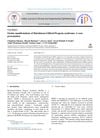 1 citations,
January 2018 in “Springer eBooks”
1 citations,
January 2018 in “Springer eBooks” Photobiomodulation is an effective and safe treatment for increasing hair growth in people with hair loss.
 1 citations,
January 2018 in “Elsevier eBooks”
1 citations,
January 2018 in “Elsevier eBooks” The skin's dermal layer contains true stem cells with diverse functions and interactions that need more research to fully understand.
 1 citations,
November 2015 in “Indian Journal of Clinical Biochemistry”
1 citations,
November 2015 in “Indian Journal of Clinical Biochemistry” The conference presented findings on how vitamin D levels, genetic factors, and lifestyle choices like smoking and yoga affect various health conditions and diseases.
 1 citations,
August 2004 in “Alternative & complementary therapies”
1 citations,
August 2004 in “Alternative & complementary therapies” Non-drug methods like diet, supplements, and aromatherapy can help manage hair loss and its emotional impact.
 July 2024 in “Science and Culture”
July 2024 in “Science and Culture” Thuja orientalis L. has many health benefits and could be used in new medicines.

The trial aims to understand how obesity and lifestyle affect circadian rhythms in people with schizophrenia and bipolar disorder.
 April 2024 in “Cell death and disease”
April 2024 in “Cell death and disease” Long COVID causes various long-term health issues and needs better awareness and treatment.
 April 2024 in “International journal of women's health”
April 2024 in “International journal of women's health” Adult female acne is a complex condition that can worsen with menopause, requiring holistic treatment and tailored skincare at different life stages.
 March 2024 in “Medical lasers”
March 2024 in “Medical lasers” Multiple-wavelength radiation helps hair grow by boosting early hair follicle development.
 February 2024 in “International journal of medical science and clinical research studies”
February 2024 in “International journal of medical science and clinical research studies” CCCA is a scarring hair disorder mainly affecting people of African descent, needing better awareness and treatment.
 February 2024 in “medRxiv (Cold Spring Harbor Laboratory)”
February 2024 in “medRxiv (Cold Spring Harbor Laboratory)” The study aims to understand how mood, physical activity, light exposure, and seasonal changes affect sleep patterns.
 January 2024 in “Research Square (Research Square)”
January 2024 in “Research Square (Research Square)” A specially designed molybdenum oxide nanozyme can treat and monitor acute kidney injury effectively.
 January 2024 in “American journal of clinical dermatology”
January 2024 in “American journal of clinical dermatology” Ritlecitinib is safe and well-tolerated for treating alopecia areata in patients aged 12 and older.

Autonomous robotic surgery is advancing but still requires human supervision for complex procedures.
 October 2023 in “Biomedical science and engineering”
October 2023 in “Biomedical science and engineering” Innovative methods are reducing animal testing and improving biomedical research.
 September 2023 in “International journal of medicine”
September 2023 in “International journal of medicine” AI is revolutionizing healthcare by improving diagnosis, treatment, and monitoring, but still needs close supervision.
 May 2023 in “Current Applied Science and Technology”
May 2023 in “Current Applied Science and Technology” Higher power CO2 laser causes more severe skin burns and damage.

Custom skincare can be made based on genes, fewer cats in Lublin have FeLV/FIV than national average, and studies also looked at small water bodies, river pollution, guppy growth, toxins in biochars, palm oil issues, and pumpkin seed oil for hair strength.
 February 2023 in “Asian journal of pharmaceutical research and development”
February 2023 in “Asian journal of pharmaceutical research and development” Flavonoids in Iraqi marshland plants have potential health benefits like antioxidant and anti-inflammatory effects.
 January 2023 in “Open Life Sciences”
January 2023 in “Open Life Sciences” VEGFR-2 activation is likely involved in hair follicle growth, survival, and development.

There is no cure for myotonic dystrophy type 1, so treatment focuses on managing symptoms and complications.
 November 2022 in “Research Square (Research Square)”
November 2022 in “Research Square (Research Square)” The research provides insights into hair follicle growth in forest musk deer by identifying key genes and pathways involved.
 August 2022 in “bioRxiv (Cold Spring Harbor Laboratory)”
August 2022 in “bioRxiv (Cold Spring Harbor Laboratory)” Mouse touch-sensitive nerve cells adjust their connections based on competition with other similar cells.
 June 2022 in “Indian journal of clinical and experimental opthalmology”
June 2022 in “Indian journal of clinical and experimental opthalmology” The report shows a young man with Hutchinson-Gilford Progeria Syndrome had typical and additional eye problems related to the disease.
 May 2022 in “Annals of the Rheumatic Diseases”
May 2022 in “Annals of the Rheumatic Diseases” It's unclear if COVID-19 vaccination causes SLE; more research is needed.

Isotretinoin may cause temporary, reversible facial hair growth in some women.

No single biomarker is reliable enough for diagnosing and assessing SLE.
 July 2021 in “Advances in laboratory medicine”
July 2021 in “Advances in laboratory medicine” Diagnosing sex development disorders requires combining medical history, physical exams, imaging, lab tests, and genetic data.
 January 2021 in “International journal of basic and clinical pharmacology”
January 2021 in “International journal of basic and clinical pharmacology” Hydroxychloroquine is less effective than betamethasone oral mini pulse therapy for treating alopecia areata.
 November 2020 in “Elsevier eBooks”
November 2020 in “Elsevier eBooks” Antiandrogens and androgen inhibitors like spironolactone, finasteride, and dutasteride can treat hair loss and skin conditions, but they have risks and side effects, including potential harm to pregnant women and risks of cancer and heart issues. Herbal remedies also have antiandrogenic effects but lack safety validation.






























